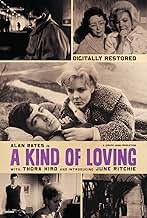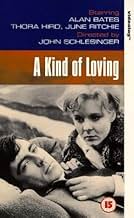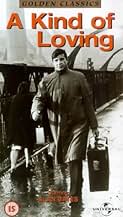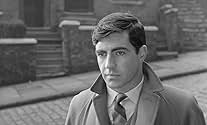IMDb-BEWERTUNG
7,3/10
2836
IHRE BEWERTUNG
Füge eine Handlung in deiner Sprache hinzuAfter his girlfriend's pregnancy forces him to marry her, a young man must adjust to his new life and contend with his domineering mother-in-law.After his girlfriend's pregnancy forces him to marry her, a young man must adjust to his new life and contend with his domineering mother-in-law.After his girlfriend's pregnancy forces him to marry her, a young man must adjust to his new life and contend with his domineering mother-in-law.
- Regie
- Drehbuch
- Hauptbesetzung
- Nominiert für 4 BAFTA Awards
- 1 Gewinn & 4 Nominierungen insgesamt
Empfohlene Bewertungen
June Ritchie makes this story work. She gives an unaffected portrayal of a young woman needing to overcome her vulnerability with a combination of guile and passive aggression. It's the truest and most honest performance in the film. Bates is a star, Ritchie works a miracle. James bolam is quietly brilliant and. The supporting cast is of the salt of the earth type of genius available to directors at that time. I did not read the book but I feel the this movie version makes the task unnecessary.? What a great period of story telling this was. Bates was wonderful on film but on stage he was even more special. I was lucky to experience both. His hamlet. Though forgotten, was so pure, so honest, so sexy.
What a great time in my life, I was 14 when this film was being made in my home town of Bolton. I had already appeared as a non speaking actor in numerous TV plays and was then offered the part of a "milk boy" in this first class film. I'm still there today in the background carrying some crates of empty milk bottles to the milk truck about 40 minutes into the film. I remember the scene was filmed in Ancoats Manchester early on a Sunday morning late in the year,it was rainy and cold, but I loved every minute of it. Met and played football with the late Alan Bates between takes, those were the days, happy or what?. After all these years its still a film which I never miss on TV and I recently bought the DVD. If you get the chance to watch this 60@s classic ,do so, you won't be disappointed.
This is a wonderful exploration of a young man's misgivings about being attached. It explores issues of manhood and love with great sincerity and sensitivity. Alan Bates is at his best here and the whole cast hits the mark under a careful eye. I think it is optimistic in its depiction, but most of all honest. The language is impeccable. How can you go wrong with lines such as "I am your husband if you did but know it"? Whistle Down the Wind is another with Bates in top form. Worth a look.
alongside Saturday Night & Sunday Morning and a Taste of Honey this is a great companion piece. Alan Bates is superb as a draughtsman in a busy factory and June Ritchie brings a tender portrayal as the object of Vics(Bates) desire. Thora Hird as the mother in law from hell is quite frightening and her scene with Vic Brown being sick behind her sofa is a classic. you filthy pig you filthy disgusting pig
You can feel her loathing. Some great support from Jack Smethhurst and the always excellent James Bolam. The scene that I favour is where Vic is getting bored with his situation and tries to get sympathy from his sister, his sister suddenly turns on him and tells him to get his life sorted, made bed lie on it etc. An absolutely fantastic slice of early 1960,s life.
You can feel her loathing. Some great support from Jack Smethhurst and the always excellent James Bolam. The scene that I favour is where Vic is getting bored with his situation and tries to get sympathy from his sister, his sister suddenly turns on him and tells him to get his life sorted, made bed lie on it etc. An absolutely fantastic slice of early 1960,s life.
Excellent work from all concerned has gone to create what is probably, in spite of its generally melancholy atmosphere, the warmest of the realistic school of British movies from the early 1960s. Vic Brown is not as angry as Arthur Seaton in Saturday Night and Sunday Morning nor as alienated from his family as Billy Fisher in Billy Liar. And he is more likable than either Joe Lampton in Room at the Top or Frank Machin in This Sporting Life. Both Vic and Ingrid are sympathetic, recognisable people, who find themselves trapped in a situation with which their society's stern morality of self-control and self-denial, vividly expressed by Vic's sister towards the end of the film, has no sympathy at all. We finish with them trying to muddle through, and it is this compassionate but still unresolved finale that gives the film its hesitant title.
On the production side, the script, taken from Barstow's novel by those two stalwarts, Waterhouse and Hall, is bang on target; the photography, never less than excellent, is often breathtaking, as in the wonderful long shot of a romantic couple on Southport beach, gradually withdrawing into the confines of a hotel bedroom. But the usually reliable Ron Grainer doesn't quite seem to know where he's going with the music.
The performances are wonderful. The Brown family is lovingly portrayed with the lightest of touches, with particular praise earned by those two veterans, Gwen Nelson and Bert Palmer, as the parents. In the workplace, a fine group of actors, a number of whom were to become household names in the UK in later years, show their true mettle. And leading them all, that magnificent trio of Thora Hird, June Ritchie and Alan Bates.
Of Bates, a fine actor, who left a legacy of performances on film, there's no need to say much: he's perfect for the role, gets under its skin, reveals the longings, the confusions, the contradictions, the lovability, the vulnerability and the folly. No one could ask for more or better.
Thora Hird went on to enjoy a considerable Indian summer of success under the wing of the playwright Alan Bennett, but in spite of some remarkable work during those years, it's at least arguable that she never did anything on screen as intensely realised as Mrs Rothwell. Hird ensures that she is never a figure of fun or a caricature - indeed, she is often very touching in her protectiveness towards her daughter - but at the same time she gives the comic side of the character full value.
June Ritchie is absolutely wonderful as Ingrid. She may never have become the star that, say, Julie Christie (somewhat unwillingly) became, but she was and still is a remarkable actress, worthy of the greatest of respect for her achievement here. In a remarkable way, she fulfils all that was required of a Hitchcock blond: cool on the outside, with fire inside. In fact there's a moment early in the film where she is photographed from Vic's point of view, from behind and slightly above, with a hairdo reminiscent of Kim Novak's in Vertigo. One wonders whether the movie-going that was so evidently part of life in the town spills over into Vic's imagination at this point.
This is the work of a director who seems to have fallen out of favour in recent years, and there is a case to be made that he somehow lost his way. But A Kind of Loving is one of a trio of films, along with Billy Liar and Sunday Bloody Sunday, of which any director could be proud. Of the rest of his output, perhaps only his final collaboration with Alan Bates, An Englishman Abroad, has the same balance of clear observation and compassion.
On the production side, the script, taken from Barstow's novel by those two stalwarts, Waterhouse and Hall, is bang on target; the photography, never less than excellent, is often breathtaking, as in the wonderful long shot of a romantic couple on Southport beach, gradually withdrawing into the confines of a hotel bedroom. But the usually reliable Ron Grainer doesn't quite seem to know where he's going with the music.
The performances are wonderful. The Brown family is lovingly portrayed with the lightest of touches, with particular praise earned by those two veterans, Gwen Nelson and Bert Palmer, as the parents. In the workplace, a fine group of actors, a number of whom were to become household names in the UK in later years, show their true mettle. And leading them all, that magnificent trio of Thora Hird, June Ritchie and Alan Bates.
Of Bates, a fine actor, who left a legacy of performances on film, there's no need to say much: he's perfect for the role, gets under its skin, reveals the longings, the confusions, the contradictions, the lovability, the vulnerability and the folly. No one could ask for more or better.
Thora Hird went on to enjoy a considerable Indian summer of success under the wing of the playwright Alan Bennett, but in spite of some remarkable work during those years, it's at least arguable that she never did anything on screen as intensely realised as Mrs Rothwell. Hird ensures that she is never a figure of fun or a caricature - indeed, she is often very touching in her protectiveness towards her daughter - but at the same time she gives the comic side of the character full value.
June Ritchie is absolutely wonderful as Ingrid. She may never have become the star that, say, Julie Christie (somewhat unwillingly) became, but she was and still is a remarkable actress, worthy of the greatest of respect for her achievement here. In a remarkable way, she fulfils all that was required of a Hitchcock blond: cool on the outside, with fire inside. In fact there's a moment early in the film where she is photographed from Vic's point of view, from behind and slightly above, with a hairdo reminiscent of Kim Novak's in Vertigo. One wonders whether the movie-going that was so evidently part of life in the town spills over into Vic's imagination at this point.
This is the work of a director who seems to have fallen out of favour in recent years, and there is a case to be made that he somehow lost his way. But A Kind of Loving is one of a trio of films, along with Billy Liar and Sunday Bloody Sunday, of which any director could be proud. Of the rest of his output, perhaps only his final collaboration with Alan Bates, An Englishman Abroad, has the same balance of clear observation and compassion.
Wusstest du schon
- WissenswertesAt the start of this movie, Victor Arthur 'Vic' Brown (Sir Alan Bates) and some of his friends are seen perusing a magazine filled with shots of topless models. This is one of the first instances in British cinema showing bared breasts.
- PatzerIn the opening wedding scene, an elderly relative is prevented from taking photographs when the wedding car pulls up in front of her. She is, however, then seen taking pictures on the other side of the car as the bride and groom get in. Then as the car pulls away, she is back in her original position on the 'wrong' side of the car, still unable to take photos.
- Zitate
Mrs. Rothwell: How dare you! How dare you say such filthy, disgusting things! You come into this house drunk, filthy drunk! You're filthy! You talk filth, you ARE filth! You're filth! You filthy pig! You filthy, disgusting pig! Filth, FILTH!
- SoundtracksDown by the Riverside
(uncredited)
Written by Billy Sherrill and Charlie Rich
Sung at a bar on the pub crawl.
Top-Auswahl
Melde dich zum Bewerten an und greife auf die Watchlist für personalisierte Empfehlungen zu.
- How long is A Kind of Loving?Powered by Alexa
Details
- Erscheinungsdatum
- Herkunftsland
- Sprachen
- Auch bekannt als
- A Kind of Loving
- Drehorte
- The Promenade, St Anne's on Sea, Fylde, Lancashire, England, Vereinigtes Königreich(honeymoon of Vic and Ingrid)
- Produktionsfirmen
- Weitere beteiligte Unternehmen bei IMDbPro anzeigen
Box Office
- Budget
- 165.000 £ (geschätzt)
- Bruttoertrag in den USA und Kanada
- 6.912 $
- Eröffnungswochenende in den USA und in Kanada
- 3.278 $
- 9. Apr. 2017
- Weltweiter Bruttoertrag
- 6.912 $
- Laufzeit1 Stunde 47 Minuten
- Farbe
- Seitenverhältnis
- 1.66 : 1
Zu dieser Seite beitragen
Bearbeitung vorschlagen oder fehlenden Inhalt hinzufügen

Oberste Lücke
What is the French language plot outline for Nur ein Hauch Glückseligkeit (1962)?
Antwort































